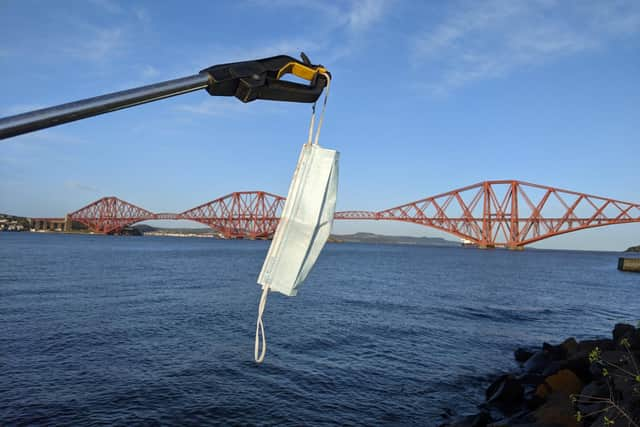Call for Scots to wear reusable masks to protect wildlife from Covid litter
The call comes as a worrying amount of coronavirus-related litter is turning up on shorelines across the country, where it poses a risk to animals and birds and adds to the increasing mountain of synthetic waste blighting rivers, seas and the countryside.
Estimates suggest three out of every ten Scots are currently using disposable masks – designed to be worn only once and thrown away – to help reduce the spread of Covid-19.
Advertisement
Hide AdAdvertisement
Hide AdThe masks cannot be recycled and should be properly disposed of in general waste bins.


However, recent clean-ups by the Marine Conservation Society found personal protective equipment (PPE), including single-use face coverings and gloves, on nearly a quarter of all Scottish beaches surveyed.
Local authorities have also reported a high rate of incorrect disposal, causing contamination of recycling collections.
Now environmental organisations Zero Waste Scotland and Keep Scotland Beautiful have teamed up with the Marine Conservation Society to raise awareness of the problem and highlight the benefits of reusable face coverings.
In Scotland it is mandatory to wear face coverings in shops, on public transport and in some school classes and communal areas.


Iain Gulland, Zero Waste Scotland’s chief executive, suggests people should get into a routine with reusable coverings to avoid being caught short.
“Even though it is a criminal offence that can result in a fixed penalty of up to £80, we have seen a huge rise in face covering litter in recent months,” he said.
“This litter can last for decades in the environment and puts many wildlife species at risk of injury, or worse.
YOU MIGHT ALSO LIKE: Islanders mock ‘rubbish’ bin rules in windy Outer Hebrides
Advertisement
Hide AdAdvertisement
Hide Ad“We’ve already seen this happening across Scotland, with marine life ingesting face coverings and birds becoming entangled in the strings.
“It is vital that more people make the switch to reusable face coverings and it becomes a daily habit to take it with you when heading out – as common as remembering house keys or phones.”
Barry Fisher, chief executive of Keep Scotland Beautiful, said: “Staying safe is, of course, everyone’s main priority at the moment. But it is extremely frustrating to see the face coverings and gloves that help to keep us safe discarded as litter when they should and could be put in a bin.
“Scotland is facing the prospect of a litter emergency, thanks to a minority of thoughtless individuals, and face coverings are just adding to this issue.”
Catherine Gemmell, Scotland conservation officer at the Marine Conservation Society, added: “Our ocean is facing unprecedented threats as it is – let’s sort this one out quickly.”
Estimates suggest more than eight million tonnes of man-made materials end up in oceans across the globe each year, killing around 100,000 sea mammals and one million seabirds annually.
As well as protecting the environment, switching from disposable to reusable face coverings works out cheaper in the long run – calculations based on daily use suggest each person could save around £180 per year.
A message from the Editor:
Thank you for reading this article. We’re more reliant on your support than ever as the shift in consumer habits brought about by coronavirus impacts our advertisers.
If you haven’t already, please consider supporting our trusted, fact-checked journalism by taking out a digital subscription. Visit https://www.scotsman.com/subscriptions now to sign up.
Comments
Want to join the conversation? Please or to comment on this article.